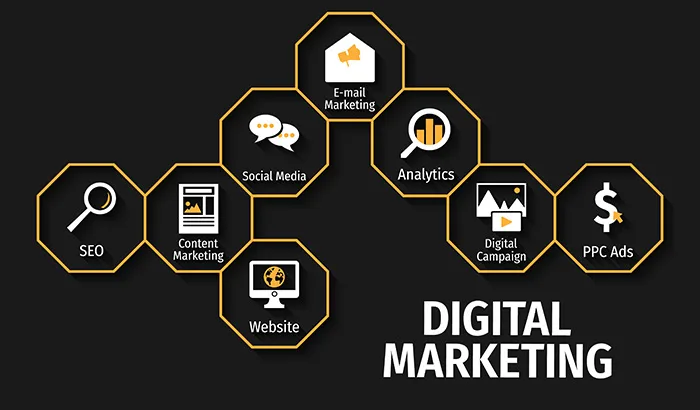
The digital marketing landscape is constantly evolving. Businesses that want to stay ahead must keep an eye on emerging trends and adapt their strategies accordingly. With technology advancing rapidly, consumer behavior is shifting, and brands must innovate to remain competitive. So, what does the future hold for digital marketing services? Let's explore some key trends that are shaping the industry.
AI is revolutionizing digital marketing by automating repetitive tasks, analyzing vast amounts of data, and delivering personalized experiences. From AI-driven chatbots to automated email marketing campaigns, businesses are leveraging this technology to enhance efficiency and engagement. Predictive analytics, powered by AI, helps marketers make data-driven decisions, improving conversion rates and customer satisfaction.
As smart speakers and virtual assistants like Alexa, Siri, and Google Assistant become more popular, optimizing for voice search is becoming a priority. Voice searches are typically conversational and longer than text-based queries, which means marketers need to adjust their SEO strategies. Adopting a natural language approach and focusing on featured snippets can improve visibility in voice search results.
Video content continues to dominate online engagement. Platforms like YouTube, TikTok, Instagram Reels, and Facebook Videos are experiencing massive growth. Live streaming, short-form videos, and interactive video content are becoming essential for digital marketing strategies. Brands that invest in high-quality video content are more likely to capture audience attention and boost engagement.
Consumers expect personalized experiences. Generic marketing messages no longer work. Businesses are utilizing data analytics and AI to deliver hyper-personalized content tailored to individual preferences. Email campaigns, product recommendations, and targeted advertisements are now driven by user behavior and purchase history, increasing conversion rates.
AR and VR are transforming the way brands interact with customers. From virtual try-ons in the fashion industry to immersive travel experiences, these technologies are creating unique engagement opportunities. As adoption grows, businesses will find innovative ways to incorporate AR and VR into their digital marketing strategies.
Influencer marketing is shifting from celebrity endorsements to micro and nano-influencers. Consumers trust recommendations from individuals with niche audiences over large-scale influencers. Brands are collaborating with smaller influencers who have higher engagement rates and credibility within their communities. Authenticity is key to making influencer marketing successful in the future.
Social media platforms are no longer just for engagement; they are becoming powerful sales channels. With features like Instagram Shopping, Facebook Marketplace, and TikTok Shop, consumers can make purchases without leaving the app. Businesses must optimize their social commerce strategies by integrating seamless shopping experiences into their digital marketing plans.
With increasing concerns over data privacy, businesses must prioritize transparency and ethical marketing practices. Stricter regulations, such as GDPR and CCPA, require marketers to be more responsible in handling consumer data. Brands that build trust through ethical marketing and clear communication about data usage will have a competitive advantage.
High-quality content remains a fundamental aspect of digital marketing. Consumers seek valuable, informative, and engaging content that positions brands as thought leaders. Long-form blogs, whitepapers, podcasts, and in-depth guides will continue to be essential for driving organic traffic and establishing credibility in the industry.
Consumers expect instant responses and real-time interactions. Conversational marketing, through chatbots, messaging apps, and AI-powered assistants, enables brands to provide immediate support and engagement. Businesses that integrate conversational marketing into their strategies can enhance customer relationships and drive higher conversion rates.
A seamless and integrated customer experience across multiple channels is crucial. Consumers interact with brands through websites, social media, email, mobile apps, and physical stores. Businesses that adopt omnichannel marketing strategies ensure consistency in messaging and customer journey, improving brand loyalty and retention.
Search engines continuously update their algorithms, affecting how businesses rank online. Google’s focus on user experience, mobile-first indexing, and Core Web Vitals means marketers must prioritize website speed, mobile optimization, and high-quality content. Staying updated with SEO trends is essential for maintaining visibility in search results.
Consumers are becoming more conscious of environmental and social issues. Brands that align with sustainability, corporate social responsibility (CSR), and ethical practices attract loyal customers. Purpose-driven marketing campaigns that showcase a brand’s values and contributions to society resonate well with modern consumers.
AI-driven tools like ChatGPT, Jasper, and Copy.ai are reshaping content creation. While human creativity remains vital, AI can assist in generating ideas, writing drafts, and optimizing content for SEO. Businesses are using AI-powered content creation to streamline workflows and maintain consistency in messaging.
Blockchain is enhancing transparency and security in digital marketing. It helps eliminate fraud in digital advertising, ensures data integrity, and provides better control over consumer data. As blockchain technology evolves, its applications in marketing will continue to grow, fostering trust between brands and consumers.
The future of digital marketing services is dynamic and filled with opportunities for businesses willing to embrace change. Staying ahead of trends like AI, voice search, video marketing, and data privacy will be crucial for success. Brands that prioritize personalization, engagement, and ethical marketing will build lasting relationships with their audiences. As technology continues to shape consumer behavior, businesses must remain agile, innovative, and customer-focused to thrive in the evolving digital landscape.